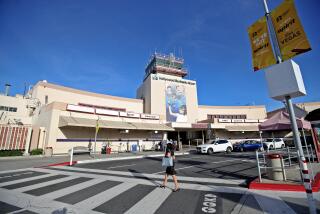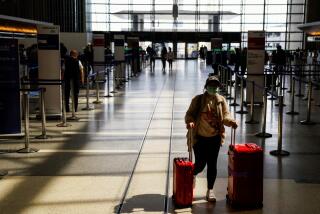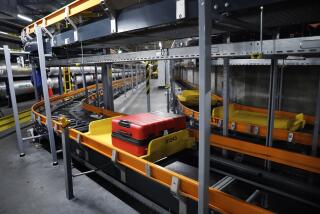Security Is Often Lax at Baggage-Claim
- Share via
WASHINGTON — Checking in at an airport, it’s hard to miss the preoccupation with baggage security.
“Did you pack your own bags?” the ticket agent asks. “Did anyone ask you to carry anything on board?”
It’s a different story when passengers arrive at their destinations.
At some airports, such as LAX, most airlines will not let passengers leave baggage claim areas without showing a claim stub for their luggage. But at others, including Reagan National and Dulles International near Washington, no one checks.
Anyone can grab anything or, perhaps more worrisome for security, can leave a bag or package behind. The only safeguards are signs or public-address warnings noting that many bags look alike so passengers should check their luggage tags.
In April 1998, police arrested a man who took advantage of such lax security at Dallas-Fort Worth Airport. They said that James Clarence Ringley of Arlington, Texas, stole about 500 bags from airline baggage belts and used the contents--worth an estimated $1 million--to stock a booth at a flea market.
Airport police said it was the largest recovery of luggage at any major U.S. airport. Ringley recently received four years in prison.
“I’ve wondered about it a few times as I’ve walked out with all kinds of bags and nobody’s checked me,” said J.T. Maiorano of New York, a lighting technician who travels more than 150,000 miles annually.
Standing outside the USAirways claim area at Reagan National, where he had just retrieved a garment bag unchallenged, Maiorano said, “I wouldn’t mind at all being checked. . . . I’d rather do it than get ripped off of my luggage.”
The federal government requires the baggage questions at check-in and the constant reminders about unattended luggage.
But security at the end of a trip--in the baggage-claim areas--is the responsibility of individual airlines. They typically lease and operate baggage belts from an airport authority. Airlines, in turn, say they provide checkpoints where they are needed.
“If we don’t have a high incidence of problems, we don’t do it,” said United Airlines spokesman Joe Hopkins. “It helps keep down the cost of air travel.”
Some airports like Hartsfield in Atlanta or Miami International provide baggage-area security in many terminals as a basic service to their airline tenants. Atlanta, which handles 200,000 passengers a day, spends about $1.5 million annually on it.
As a result, said Hartsfield spokeswoman Lanii Thomas, the airport does not have a high rate of baggage theft.
Airports generally don’t keep track of stolen bags, deferring to the airlines. The carriers themselves are loath to report a bag as stolen, preferring to say that it is “missing.” Often a bag that has been reported stolen ends up back at its intended destination after a journey on the wrong flight.
The Transportation Department tracks mishandled bags--those that are lost, damaged, delayed or “pilfered.” In March, the major U.S. airlines had about five reports of mishandled bags for every 1,000 they handled, about the same as the year before.
Tightening security at baggage-claim areas is not always foolproof.
In 1996, Los Angeles police arrested a man who allegedly raided the airline baggage belts at LAX and walked away with 11 sets of golf clubs, professional camera equipment, a snowboard and other items worth an estimated $20,000.
The airport had and continues to use a bag-matching program, but the suspect found a way around it: He wore a Delta Air Lines pilot uniform and a fake ID and strode confidently past the checkout gates.
More to Read
Sign up for The Wild
We’ll help you find the best places to hike, bike and run, as well as the perfect silent spots for meditation and yoga.
You may occasionally receive promotional content from the Los Angeles Times.






